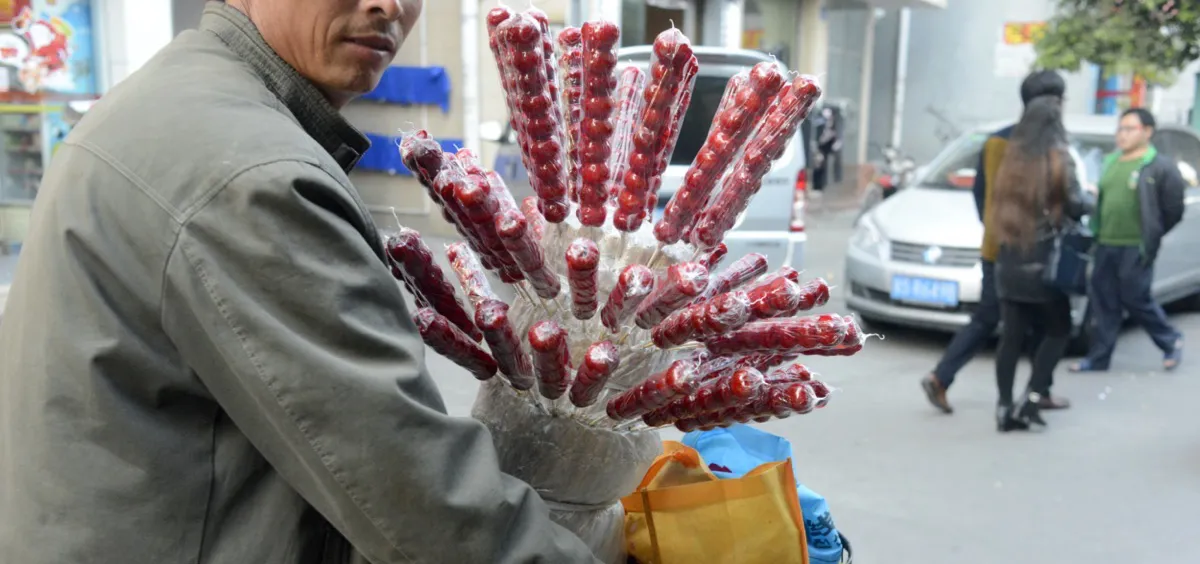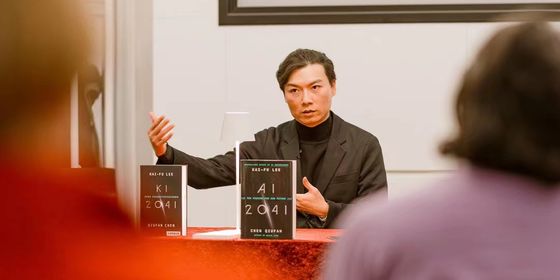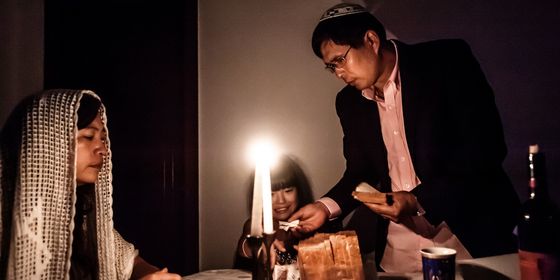“I’ve had a hell of a life!”—a bingtanghulu vendor (and ex-millionaire) shares his bittersweet memories
Li Baitian, 56 years old, street vendor from Jilin province
My life has been a story of ups and downs. I’ve been through everything.
Let me start with my childhood. People my age are probably the last generation in China to have really suffered. I’ve never been to school, but started working hard on the farm in my early teens. I earned “work points” from the village commune. It was tough. We ate from the communal canteen: pancakes with some salted vegetables underneath. Everyone got two pancakes each, whether or not it filled you up.
I can’t read, but I’m pretty smart. I started raising pigs in my early 20s. With my first batch, I earned over 30,000 kuai—pretty good money for that time. I circled off the land in front of my house into a pigsty. My business grew. Soon, I was hiring workers to help transport my pigs all around China. On my best day, I sent away six truckloads of pigs. That’s a profit of tens of thousand kuai in just one day. I was a gold card user at the bank. I had to make appointments with the bank to withdraw any money, since the sum was so big.
That was before Jilin’s CP Group started to make pig feed. As a farmer who couldn’t read, who became a millionaire by raising pigs, I was a legend. My story was reported by the Heilongjiang and Jilin province TV channels.
Fame and fortune invite trouble. I got into gambling, to the point that I would travel down to Macau to gamble. The first time I went, I won 5 million overnight. I was so elated that I kept going back. The second time, I was dumbfounded to lose 10 million. They wouldn’t let me leave the casino until my family wired over the money I owed. My wife was so angry when she got the call that she cried.
I didn’t learn my lesson. I just got more and more addicted. There were many casinos, big and small, operating openly in Jilin back then, even though it was illegal. I gambled for seven or eight years until I fell from a millionaire to a pauper. Meanwhile, the pork industry was slowing down, and it was no longer profitable to raise.
Seeing no other way, my wife came to Beijing to take a course and get a nanny certificate, since she heard that a nanny could make over 10,000 kuai per month here. She paid more than 7,000 for the course, and got her certificate, only to find that nobody wanted to hire a nanny over 50 years old. She called me to complain. Without a second thought, I came here to join her.
When I first arrived, I wanted to work as a courier; except, as it turned out, they don’t hire couriers over 50 either. I found an odd job which paid 200 kuai per day. One day, I was walking past a jianbing pancake stall where customers were queuing up. I thought to myself, this looks like a promising business. So I stopped and watched the vendor for a long time, then got the equipment and practiced on my own. After some practice, I said to my wife: “I’ve got it! We’ll open for business tomorrow!” That was how we got started.
On the first day, we only made 35 kuai. I was still too green and too clumsy. On the second day, we made 700 kuai. That really motivated me. We usually set up near Nanchizi Street, next to the Forbidden City. There are many tourists there, so we could sell at a slightly higher price, 10 kuai apiece.
However, we were often harassed by the city management police. They’d take away everything, including our tricycle. When they were at their most active, I was raided five times in three days.
I don’t give up easily. As soon they took my stuff, I would buy an old tricycle tricycle for 200 kuai, and a gas tank for a few dozen more. As for the iron griddle, you could easily pick one up just strolling around the hutong. I’d fix up the tricycle and be ready to sell again the next morning; no time wasted.
I was arrested a few times for hawking on the street. The first time they kept me until midnight. There were times when I was kept for five or seven days. The longest was 10 days.
Here’s the thing about me—I can keep smiling no matter what happens to me. Since I couldn’t earn money, I’d thought I might as well enjoy myself. You could eat as many steamed buns as you wanted at the detention center.
Since they kept arresting me for selling jianbing, I turned to selling bingtanghulu (a traditional Beijing snack made of sugar-coated hawthorn berries). It was easier since I could just ride my bike around and sell them.
Every morning, I spend an hour melting the sugar and preparing the fruits. When everything is ready, I head to the north gate of the Forbidden City to sell. After 5 in the afternoon, I move to Dengshikou, where there is normally a busy crowd. I grab some street food for lunch, and usually sell until 11 at night, or sometimes midnight. I cook something for dinner after I get back home. It’s a tiny single-story room that costs me 1,500 kuai per month to rent.
I can sell about 100 bingtanghulu per day when business is good. Otherwise, it’s usually 60 or 70. Hard to say; there are usually more customers around the holidays.
In the old days, people didn’t have the luxury of so many snacks. A strand of bingtanghulu could make a child’s day. Nowadays, if you look around, there are millions of different types of food people can have, and with online shopping, you can get almost any snack from anywhere in the country sent to your door with a few clicks on your phone. Nobody is impressed by bingtanghulu anymore.
I’ve had a hell of a life! I used to earn money by the millions, but now I earn it kuai by kuai.
Still, not having much money doesn’t bother me at all. I don’t think money makes a difference in whether you have a happy life. Even if you owned a whole building, you could only use at most 10 square meters of it to sleep. I never compare myself to people with a big fortune. You never know what they could be going through. Stay happy, stay healthy—that’s what matters most.
Cover image from VCG
Huang Chenkuang is a writer based in Beijing originally from Jiangxi province. She is the founder of the Beijing Lights project with literary arts collective Spittoon, sharing voices from Beijing’s 21.7 million humans.













